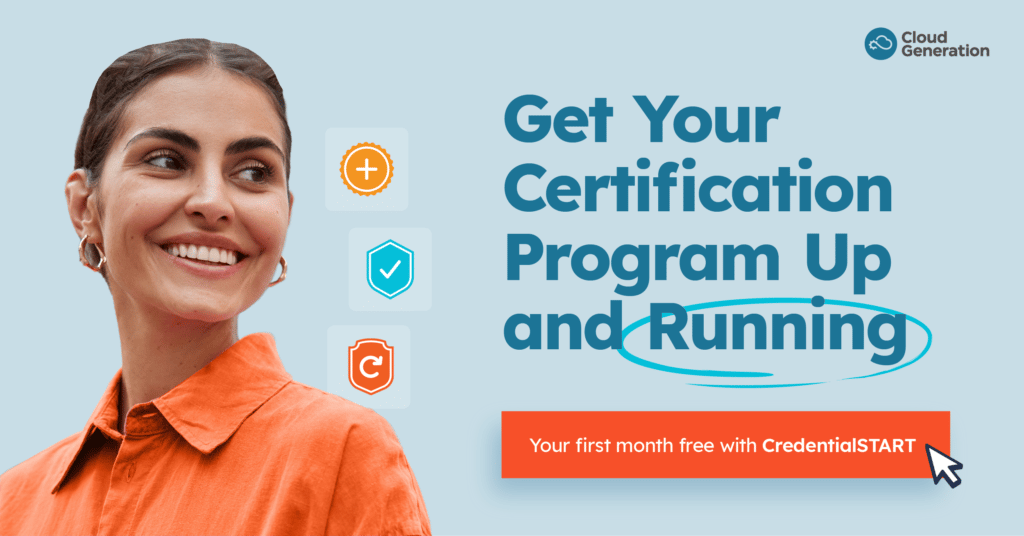
1EdTech has been instrumental in the creation and ongoing management of important standards in the world of online learning. Formerly known as IMS Global, 1EdTech is a member-based community dedicated to powering learner potential. Its members include institutions and tech providers that work together to make learning technology better, safer, and more interoperable.
In this episode of the Leading Learning Podcast, co-host Jeff Cobb talks with Mark Leuba, vice president of product management at 1EdTech and Kelly Hoyland, director for higher education programs at 1EdTech. They focus on 1EdTech’s work with digital credentials. They look at the current digital credentials landscape, the growing adoption, and potential challenges. They also discuss Open Badges and the Comprehensive Learner Record, two key standards developed by 1EdTech that are aimed at addressing some of the challenges that exist in the evolving market for digital credentials.
To tune in, listen below. To make sure you catch all future episodes, be sure to subscribe via RSS, Apple Podcasts, Spotify, Stitcher Radio, iHeartRadio, PodBean, or any podcatcher service you may use (e.g., Overcast). And, if you like the podcast, be sure to give it a tweet.
Listen to the Show
Access the Transcript
Download a PDF transcript of this episode’s audio.
Read the Show Notes
[00:00] – Intro
Current Digital Credential Landscape
[01:46] – How you would describe the current landscape for digital credentials?
Kelly believes now is an exciting time. People are looking at how to best help learners through a new lens that considers many perspectives:
- Where does education go in the future?
- What do our adult learners need?
- How do we make sure that we’re giving them value in the experiences?
- How do we make sure that the outcomes are obvious and clear?
- How do we make sure credentialing and work align?
Digital credentials allow institutions and learning providers to share the value of the outcomes (the competencies and skills that come from training), and they also allow learners to self-advocate and put what they’ve learned front and center.
There are a number of organizations collaborating in the space to ensure they work together and not against each other in the area of digital credentials and send consistent, rather than competing, messages.
That kind of collaboration and consistent messaging will be crucial in help employers understand the value and meaning of digital credentials. If different digital credential providers use different language, employers will be confused, and that will hamper adoption.
[04:06] – Mark shares that the digital credentials movement is strong in traditional education, training organizations, and corporate employers that are dealing with upskilling.
Learners and workers want to be recognized for their achievements and capabilities—and traditional means don’t work well. Whether it’s a transcript, a PDF, etc., traditional credentials don’t communicate what a learner actually knows and can do. But digital credentials do that, and they’re verifiable on the Web. They are the new currency for personal and professional achievement.
[04:51] – We’ve seen a proliferation in credentials over the past several years. Does that jibe with what you’re seeing, and do you have any idea what the growth rate has been?
Mark points out that we should distinguish between credentials generally and digital credentials. There are up to 800,000 unique credentials that are possible to be earned in the U.S. if we include certifications, degrees, certificates, and badges.
In the case of Open Badges, for example, we do know that there have been 75 million badges that have been issued in the U.S. alone by 15,000 organizations. So that’s a tribute to the strength of the movement. It’s very, very significant.
Mark Leuba
The SUNY system in New York offers over 500 different types of microcredentials in 60 different areas. That’s a single system producing that many microcredentials on its own.
Mark ties the uptake of competency-based education in traditional academics to the growth of credentials. It has become increasingly important to correlate a course with learning outcomes and align those to skills that are relevant in the industry.
Across the academic spectrum, institutions are laser-focused on their industry partners, and they’re starting new strategic programs to understand what the employer needs are. They’re embracing a more active role for employers and industry in the development of their curriculum and associated assessments so that, when a credential is being produced, it has more value for and can be trusted by all.
Leading Learning Newsletter
[07:39] – As someone who listens to the Leading Learning Podcast, you should know about the Leading Learning newsletter.
The newsletter is inbox intelligence for learning businesses and helps you understand the latest technology, marketing, and learning trends and grow your learning business. Best of all, it’s a free resource. As a subscriber, you’ll get Leading Links, our monthly curated collection of resources to help you grow the reach, revenue, and impact of your learning business; the podcast digest, a monthly summary of podcast episodes released during the previous month; plus periodic announcements highlighting Leading Learning Webinars and other educational opportunities designed to benefit learning business professionals.
Subscribe for free. Or, if you’re already subscribed, point a colleague to leadinglearning.com/inbox.
Open Badges and the Comprehensive Learner Record
[08:28] – 1EdTech has developed two key standards aimed at addressing some of the challenges in the evolving market for digital credentials: Open Badges and the Comprehensive Learner Record (CLR). Would you tell us about those standards and what each one is designed to address?
Open Badges
[08:53] – The Open Badges standard has been around for several years and has a rich community and culture around it.
Open Badges allow users to capture their achievements in a digital wallet or some other format so they can take them with them. The Open Badge standard means those achievements can be posted to social media, but more importantly it’s tied to a rich set of data behind that provide details about what it means to have earned that badge, when it expires, who issued it, and whether it’s from a trusted source.
Check out our related episode “Leading the Open Badging Movement with Wayne Skipper of Badgr.”
Comprehensive Learner Record (CLR)
The Comprehensive Learner Record allows learners to create a full picture of their learning. They can capture multiple achievements and link them together in a context.
It can be badges; it can be courses; it can be experiences. All of that stuff rolled together provides that holistic background for an individual, whether it’s education, whether it’s work, all of that together.
Kelly Hoyland
The CLR is machine-readable, so it can be reviewed and mined by artificial intelligence and other tools now processing resumes, for example.
[10:29] – If an organization has a credential that they want to be able to issue digitally, how do they then know how to get it into the Open Badges standard and make use of the CLR?
The most common approach is to look for a vendor partner that knows and has embraced these standards. 1EdTech has a directory that lists vendor partners that have been certified, meaning they’ve gone through conformance testing to ensure that they are ready and able to share credentials in the market.
Even with a vendor partner, there is a lot of work for an organization to do with program planning, definitions, and governance. The technology piece is sometimes the easier part.
There are a few organizations that have built their own technology solutions, and 1EdTech has resources available to help. But most organizations use a technology partner.
[11:38] – Do you have resources that organizations can take advantage to help with the design, planning, and governance of digital credentials?
1EdTech has a number of resources that its community has curated. Organizations are working together to offer guidance pulled from different stakeholders and create a playbook with what you need to think about and key questions you need to answer to get started with digital credentials.

Credential Value in the Employment Market
[12:17] – How are you working to build the bridge between credentials, the credential issuer, and employment? What standards apply in that area?
If digital badges aren’t valued and in demand in the educational-work ecosystem, their value is almost zero. 1EdTech has been focusing on employer engagement for the last several years.
1EdTech recognized there was a lot it didn’t know about employers’ needs related to digital credentials and skills. It also knew that the corporations and employers were often unaware of the digital badges and digital credentials emerging.
So 1EdTech started Wellspring, an initiative to help it learn about employer readiness. The initiative allows 1EdTech can see how employers react to the concept of digital credentials and to discover regulatory, cultural, and/or legal barriers to adoption.
1EdTech built an applicant tracking system that can search the Virtual Talent Network, a collection of digital wallets and achievement portals that are hosted by simulated organizations.
Even though this is demonstration software currently (i.e., not yet in a production status), it allows 1EdTech to show employers the value of using open standards to improve hiring and make it lower bias. The system allows candidates to be screened in an anonymized fashion and focus exclusively on knowledge, skills, and abilities.
Employer Adoption of Credentials
[15:26] – Are employers receptive to digital credentials? How have you found employer update?
Employers are using digital credentials for their own purposes. For example, Grow with Google and Amazon are acting as educators. Some employers are issuing digital credentials to their employees as signals of learning and achievement they can share and to advance their careers along defined pathways.
Industries on the Leading Edge of Credentials
[16:49] – Does it tend to be tech-oriented companies (like Google, Amazon, and Microsoft) that are leading adoption of digital credentials? Are you seeing less tech-heavy companies embracing them too?
While tech companies are leading, there’s no reason that needs to be the case. Digital credentials can be relevant and valuable outside the tech industry too.
1EdTech is doing a project as part of Wellspring with the HR Open Standards organization to help develop a resume standard that will incorporate digital credentials. This will lead to the ability to present a resume in a standards-based way with verifiable digital credentials included.
1EdTech’s Engagement with Associations and Other Learning Businesses
[18:44] – Is 1EdTech engaged with players besides higher education and academic institutions in the credentialing world, such as trade and professional associations? To what extent have you seen examples of these other players embracing and implementing the standards?
1EdTech was born in formal education, but it has developed solid relationships with organizations that serve the adult learning market and professional and continuing education.
But Mark sees an opportunity for growth and outreach, and he looks forward to 1EdTech establishing more relationships assisting other like-thinking organizations.
Digital Credentials Summit
[20:05] – Why might listeners want to consider attending the Digital Credentials Summit?
The Digital Credentials Summit is completely focused on digital credential, making it unique. The summit involves K-12, higher ed, and employers. Some attendees are new to digital credentials, and others are leaders and experts in the space.
The event is a mix of strategy and implementation, general and breakout sessions (about 60 in all).. There’s a lot of opportunity to connect with others who are working with digital credentials. There are typically about 400 attendees.
1EdTech is focused on helping the education and employment communities come closer together and building bridges between learning and work.
Lifelong Learning Habits
[23:20] – What kinds of learning experiences do you engage in? Do you find different forms of credentialing valuable to you personally?
Kelly realizes she has done a lot of training and professional development that provides no outcome other than that she’s completed it. Going forward, she wants to prioritize looking for learning experiences that issue digital credentials and start collecting those more intentionally.
Mark is an avid reader of current events and history. He’s not currently pursuing a credential, but, as a hiring official, he’s changed hiring requirements to be more intentional, now focusing on what is necessary to do the job and not falling back on a degree requirement as a baseline.
For hiring, Mark’s focusing more and more on certifications because he is finding those tend to an effective way to target the right skills he’s hiring for.
[26:42] – Wrap-up
Mark Leuba is vice president of product management at 1EdTech, formerly known as IMS Global. Kelly Hoyland is director for higher education programs at 1EdTech.
To make sure you don’t miss new episodes, we encourage you to subscribe via RSS, Apple Podcasts, Spotify, Stitcher Radio, iHeartRadio PodBean, or any podcatcher service you may use (e.g., Overcast). Subscribing also gives us some data on the impact of this particular part of our content strategy.
We’d also be grateful if you would take a minute to rate us on Apple Podcasts at leadinglearning.com/apple or wherever you listen. We personally appreciate reviews and ratings, and they help us show up when people search for content on leading a learning business.
Finally, consider following us and sharing the good word about Leading Learning. You can find us on Twitter, Facebook, and LinkedIn.
Episodes on Related Topics:


 Chatting about ChatGPT and Learning Businesses
Chatting about ChatGPT and Learning Businesses
Leave a Reply